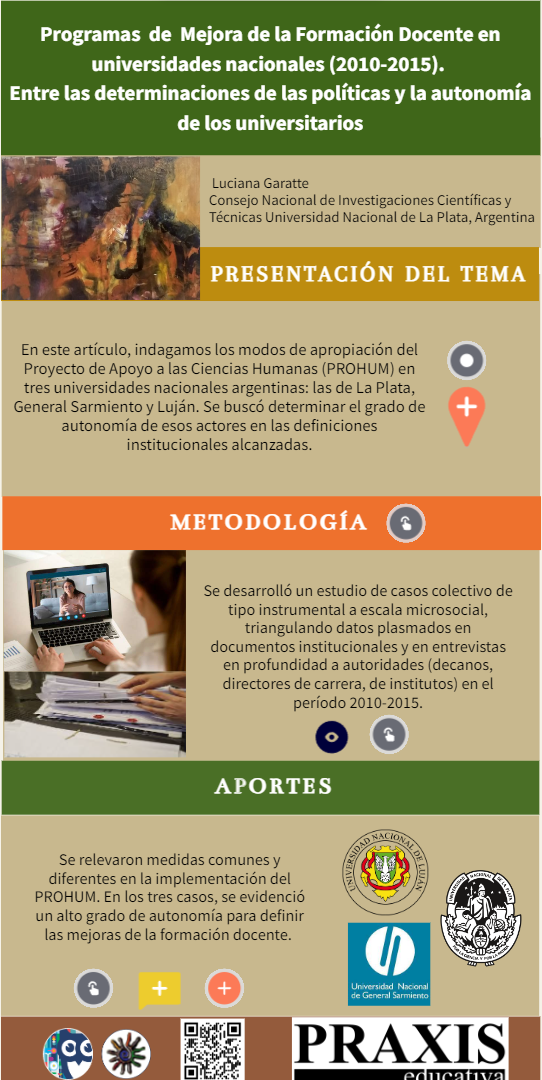Programas de melhoria da formação docente nas universidades argentinas (2010-2015). Perspectivas e experiências entre as determinações das políticas nacionais e a autonomia universitária
DOI:
https://doi.org/10.19137/praxiseducativa-2024-280109Palavras-chave:
programas educacionais; treinamento de profesores; universidade nacional; ciências humanas; autonomíaResumo
Neste artigo, investigamos os modos de apropriação do Projeto de Apoio às Ciências Humanas (PROHUM) em três universidades nacionais argentinas: La Plata, General Sarmiento e Luján. Foi realizado um estudo de caso instrumental coletivo em escala microssocial, triangulando dados de documentos institucionais e entrevistas em profundidade com autoridades. A pesquisa buscou determinar o grau de autonomia desses atores nas definições institucionais alcançadas. Entre as medidas comuns, foi dada prioridade ao fortalecimento do número de cargos docentes em disciplinas de ensino nas disciplinas incluídas no PROHUM. As medidas de consolidação de equipes para as etapas iniciais dos cursos de graduação também tiveram lugar de destaque. Entre as diferenças, destacam-se os critérios que orientaram as decisões em cada caso: a massividade ou a situação de evasão nos primeiros anos. Nos três casos, ficou evidente um alto grau de autonomia na definição de melhorias na formação de professores.
Downloads
Referências
Bourdieu, P. y Wacquant, L. (1995). Respuestas por una antropología reflexiva. Editorial Grijalbo.
Buchbinder, P. (2005). Historia de las universidades argentinas. Editorial Sudamericana.
Carli, S. (2012). El estudiante universitario. Hacia una historia del presente de la educación pública. Siglo XXI.
Chiroleu, A., Suasnábar, C. y Rovelli, L. (2012). Política universitaria en la Argentina: Revisando viejos
legados en busca de nuevos horizontes. Universidad Nacional de General Sarmiento.
Clark, B. (1983). El sistema de educación superior. Una visión comparativa de la organización académica.
Universidad Autonomía Metropolitana.
Felipe, C. (2020). La institucionalización y legitimación de los estudios universitarios en Educación Física: El
caso de la Universidad Nacional de La Plata (Argentina, 1953). Debate universitario, 8(16), 39-52.
https://www.memoria.fahce.unlp.edu.ar/art_revistas/pr.12100/pr.12100.pdf
Frederic, S. y Soprano, G. (2005). Cultura y política en etnografías sobre la Argentina. Universidad Nacional de
Quilmes/Prometeo Libros.
García de Fanelli, A. (2008). Contrato-programa: instrumento para la mejora de la capacidad institucional y la
calidad de las universidades. IIPE UNESCO.
Krotsch, P. (2001). Educación superior y reformas comparadas. Universidad Nacional de Quilmes.
Krotsch, P., Camou, A. y Prati, M. (2007). Evaluando la evaluación. Políticas universitarias, instituciones
y actores en Argentina y América Latina. Prometeo.
Marquina, M., Chiroleu, A. y Rinesi, E. (Coord.). (2012). La política universitaria de los gobiernos Kirchner.
Continuidades, rupturas, complejidades. Editorial de la Universidad Nacional de General Sarmiento.
Marquina, M. y Polzella, Á. (2015). El impacto de la Nueva Gestión Pública en las universidades y la
emergencia de nuevos roles. Comparando contextos, sistemas y abordajes teóricos para su estudio en distintos
casos nacionales. Revista Argentina de Educación Superior, 7(11), 9-27.
Marquina, M., Gimenez, G., Rodriguez, W. y Mazzeo, I. (2022). Implicancias del Aseguramiento de la Calidad
(AC) en las universidades argentinas. Revista Educación Superior y Sociedad, 34(1), 104-130.
https://www.iesalc.unesco.org/ess/index.php/ess3/article/view/577
Mollis, M. (1996). El sutil encanto de las autonomías. Una perspectiva histórica y comparada. Revista
Pensamiento Universitario, (4/5), 102-115.
Montenegro, J. (2020). La Reforma Puiggrós a la Ley de Educación Superior y sus efectos en el acceso a la
Universidad Nacional de La Plata: El caso de la Facultad de Ciencias Médicas [Tesis de doctorado].
Universidad Nacional de La Plata. http://memoria.fahce.unlp.edu.ar/tesis/te.1824/te.1824.pdf
Neiman, G. y Quaranta, G. (2006). Los estudios de caso en la investigación sociológica. En I. Vasilachis de
Gialdino (Coord.), Estrategias de investigación cualitativa (pp. 213-238). Gedisa.
Peterson, M. (2007). The study of colleges and universities as organizations. En P. Gumport (Comp), Sociology
of Higher Education. Contributions and their contexts (pp. 147-184). Johns Hopkins University Press.
Revel, J. (2005). Un momento historiográfico. Trece ensayos de historia social. Manantial.
Suasnábar, C. y Rovelli, L. (2011). Políticas universitarias en Argentina: entre los legados modernizadores y la
búsqueda de una nueva agenda. Innovación educativa, 11(57), 21-30.
https://www.memoria.fahce.unlp.edu.ar/art_revistas/pr.9838/pr.9838.pdf
Universidad Nacional de La Plata (2023). Estadísticas
UNLP: https://unlp.edu.ar/gestion/plan_estrategico/indicadores/la-unlp-en-numeros-17580-22580/
Universidad Nacional de Luján (1996). Informe de autoevaluación institucional realizado en 1996.
Disponible en www.coneau.gob.ar/archivos/publicaciones/evex/lujan.pdf,
http://www.unlu.edu.ar/doc/proy-inst-est/proy-inst-est-unlu.pdf.
Universidad Nacional de Luján (2021). UNLu Anuario Estadístico, Área de Estadísticas Universitarias, 2021,
rio%20Institucional%202021.pdf
Universidad Nacional de General Sarmiento (2023). UNGS: Estadísticas universitarias.
https://www.ungs.edu.ar/institucional/informacion-y-estadisticas-universitarias/formacion.
Vezub, L. (2007). La formación y el desarrollo profesional docente frente a los nuevos desafíos de la
Escolaridad. Profesorado. Revista de Currículum y Formación del Profesorado, 11(1). Chrome
extension://efaidnbmnnnibpcajpcglclefindmkaj/https://www.ugr.es/~recfpro/rev111ART2.pdf

Publicado
Edição
Seção
Licença
Aviso de direitos autorais
Comitê Editorial Revista Práxis Educativa:
Declaro que sou o autor do artigo intitulado (nome do artigo), que o mesmo é original e de minha autoria e que não foi publicado anteriormente em qualquer outro formato ou meio. Declaro saber que a revista não me cobrará nenhum tipo de taxa em hipótese alguma, nem receberei qualquer tipo de remuneração monetária.
Caso seja aceito para publicação na Práxis Educacional, autorizo a referida revista a publicá-lo digitalmente e a divulgá-lo em suas redes sociais.
Se o trabalho for publicado, aderi à licença Creative Commons denominada "Atribuição - Compartilhamento Não Comercial pela mesma Licença CC BY-NC-SA", por meio da qual é permitido copiar, reproduzir, distribuir, comunicar publicamente o trabalho e gerar trabalhos derivados , desde que o autor original seja citado e reconhecido. Esta licença está em uso desde setembro de 2018. Em 2016 foi aderido ao CC BY NC ND 4.0; e nos anos de 2017 e 2018 (janeiro-agosto) CC BY NC 4.0.
Esta licença CC BY-NC-SA Share Alike não permite, entretanto, o uso comercial da obra. Como autor, a revista poderá estabelecer acordos adicionais para a distribuição não exclusiva da versão do trabalho publicado na revista, permite-me autoarquivar os artigos publicados, na sua versão post-print, em repositórios institucionais, temáticos , páginas web pessoais ou qualquer outro uso relevante. com o reconhecimento de ter sido publicado pela primeira vez nesta revista.
SA Práxis Educacional adere à DORA (Declaração sobre Avaliação de Pesquisa) assinada em São Francisco, Califórnia, em 16 de dezembro de 2012, e à Declaração do México (Declaração Conjunta LATINDEX - REDALYC - CLACSO - IBICT).














_(1)2.png)


3.png)











_(2).png)






2.jpg)









